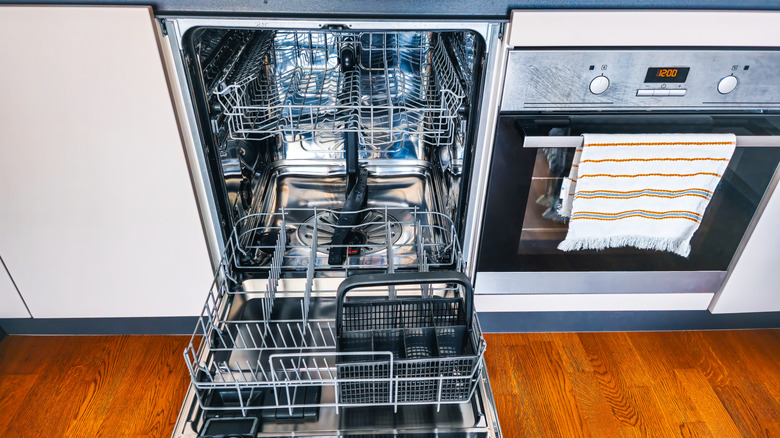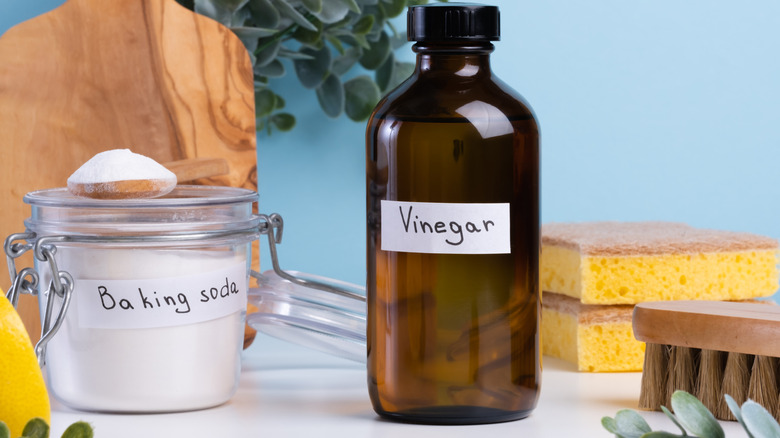The Vinegar Hack To Cleaning And Descaling Your Dishwasher (The Right Way)
The dishwasher is one of the most overlooked appliances when it comes to cleaning. While it's common to use the dishwasher almost daily, most of us don't give much thought to cleaning it regularly. But if you want to use your dishwasher better and keep it working efficiently, frequent cleaning is a must. The good news is that you don't need to run out to the store to buy cleaning products just for your dishwasher. The vinegar you have in your pantry, plus a sprinkle of baking soda, can clean and descale your dishwasher in no time.
Cleaning your dishwasher can sometimes feel unnecessary. After all, you're loading it up with detergent regularly, so it seems like the machine would get a good scrub while it's washing the dishes. But think of all the gross bits of food, oil, and grease that go through it on a constant basis. That residue can build up inside the dishwasher, where it not only causes nasty odors, but also prevents components like the spray arms from working properly. It may even cause bigger problems like clogs and blockages. It's not just food residue you have to worry about, either. Mineral buildup from the water and detergent residue can also cause issues if left to accumulate. By simply running a cycle with a vinegar solution and then another with baking soda, you can not only sanitize your dishwasher, but also help it run more effectively and extend its lifespan.
The cleaning power of vinegar and baking soda
Vinegar is a very versatile cleaning tool. The reason it works so well to cut through grime, grease, limescale, and soap scum is due to its acidic properties. Acetic acid is one of its main components, with most vinegars containing between 4% and 18%. For cleaning dishwashers and other items around the house, white vinegar, which typically has about 5% acetic acid, or cleaning vinegar, which usually contains 6%, are the best options. You want the vinegar to be acidic enough to dissolve buildup inside the appliance but mild enough that it won't damage the surfaces and components.
Studies have also found that vinegar's acetic acid has antibacterial and antifungal properties. That can come in handy inside your dishwasher, where mold can sometimes grow. Vinegar can also fight food-borne bacteria that might be lurking in your dishwasher, lingering on surfaces like cutting boards and knives.
Baking soda's ability to neutralize odors is one of the reasons why it works so well for cleaning dishwashers. It can even deodorize when dissolved in water, so it can banish any funky odors you notice when unloading the dishes. However, baking soda is also slightly abrasive, which allows it to scrub away the residue inside your dishwasher too.
How to use vinegar and baking soda to clean and descale a dishwasher
While there are several easy ways to clean your dishwasher, this vinegar and baking soda hack is a non-toxic and stress-free solution. Start by emptying your dishwasher and wiping down the interior to remove any large food particles or visible residue. Fill a dishwasher-safe bowl or cup with 1 to 2 cups of vinegar, and place it on the top rack. Run your dishwasher's hottest cycle, but turn off the drying cycle. This process will disperse the vinegar solution throughout the machine, and the hot temperature will cause some of the vinegar to vaporize into steam, helping to clean all of those hard-to-reach places.
Remove the bowl when the vinegar cycle is complete, waiting for the dishwasher to dry completely before sprinkling a cup of baking soda across the bottom of the machine. Choose a short hot water cycle, once again turning off the drying feature. Instead, open the door when the cycle finishes and allow the inside to air-dry for a few minutes.
Vinegar and baking soda can effectively clean, descale, and deodorize your dishwasher when used in successive cycles. However, you shouldn't use them at the same time. While mixing the two isn't as dangerous as other cleaning product combinations, the acidic vinegar and basic baking soda foam up when used together, producing carbon dioxide gas. When kept in a sealed container for some time, carbon dioxide may sometimes explode, so it's best not to risk it.


